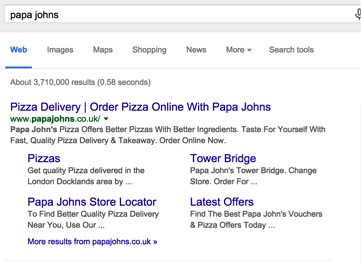Editor’s Note: This article is a part of our Hero Conf London Guest Post Giveaway. Based on a combination of pageviews, shares and editorial review from the PPC Hero writing staff, a winner will be chosen from the finalists we post throughout the week. Today’s post comes to us from Anthony Pearce (@PearceAnthony), PPC Lead at Swoon Editions.
Anyone working in PPC will, at some point, be asked about the validity of bidding on pure brand terms. Why pay for clicks and sales you would get for free through the organic listings? It seems like a fair question.
Now, the answer I used to give to this question was to quote the incremental clicks argument, point to the positive QS impact it has on the rest of the account and highlight the fact that pure brand clicks are really cheap anyhow. As I’ve become older and more cynical, however, I’ve become less convinced by these stock arguments. If it were my site and my budget, would I really bid on my own pure brand keywords?
What Are Pure Brand Keywords?
Pure brand keywords are generally the top 1-5 brand keywords in the account that don’t include any generic part. For a brand like Airbnb, the pure brand keywords would be [airbnb] and [air bnb]. You could also probably add in a few variations or misspellings into the mix in this particular example, like [air b&b] and [air b and b].
Bidding On Pure Brand
Bidding on pure brand keywords is open to scrutiny, because 99.9% of the time the brand website ranks in position one organically for these terms and generally with organic site links fully expanded. See below the SERP here in the UK for [papa johns].

At face value, it would seem silly for Papa Johns to start bidding on their pure brand term, as surely they would just be paying for clicks and sales that would happen anyway via the organic listing?
In this particular case, it could be difficult to argue bidding on this keyword will really increase the overall clicks to the site. Even if there is an overall incremental uplift for this keyword, then it’s likely to be quite small and not necessarily worth the additional cost.
I’m also not convinced that the +60% CTR that is achievable for this keyword will really positively impact the rest of the account.
Finally, although the cost per click will be very low, they’re still not as cheap as the free clicks the organic listing will garner.
There are, however, some more palatable reasons you may want to bid on your pure brand keywords.
1) To act as a deterrent to competitor bidding
There is little doubt that bidding on your own pure brand keywords will act as a deterrent to competitors doing so. Even if a competitor does take up the challenge then as long as you have a good ad copy in place, with all ad extensions fully implemented, it’s going to be difficult for them to last more than a few days before their quality score is 1 and cost per click is $5 or higher.
2) To push traffic to pages other than the homepage
One drawback with the organic listing is that it will usually point to your home page. With a PPC ad, you have much more control. Maybe you have a sale on, or maybe you want to send traffic to a newsletter sign-up page to push email subscriptions. The world is your lobster.
3) To control sitelinks
Although you can demote sitelinks in Google Search Console, generally you have much more control over your PPC sitelinks. You could promote sales and offers in your PPC sitelinks, newsletter sign-up pages or specific product and category pages. Most importantly, you can also test which combination works the best.
4) To measure brand awareness over time
Bidding on your pure brand terms can be a great way to measure brand awareness over time. Is your brand growing? How is it changing across devices? What impact did your TV campaign have? You can get answers to all these questions in real-time.
5) To push negative news stories below the fold
If your brand is in the news for the wrong reasons you can use a PPC ad to help push these negative headlines in the Google news section and organic listings, well below the fold.
6) To highlight unique selling points
If you want to push home your unique selling points, utilizing the callout extensions in your PPC ads can help.
7) To highlight positive reviews
If your brand has great reviews then a PPC ad can help highlight these by using the review stars and the review extension functionality.
8) If your brand is not in position 1 organically
If your brand is relatively new then your site may not rank in position 1 organically for your pure brand terms. In this case, you could use a PPC ad to make sure your customers can actually find you. Likewise, if your site has been hit by an SEO penalty then it might not even be on page one of the results page.
Conclusion
There are plenty of good reasons to bid you your own pure brand terms, but you need to look at it on a case-by-case basis. For some brands, it may just not make sense, but for other brands it could be essential.
Can you think of any other reasons to bid on pure brand terms? Leave your comments below!




